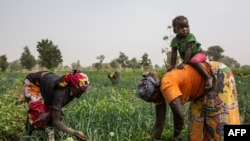Several hundred Cameroonian widows gathered in the capital, Yaounde, to observe International Widows Day by protesting traditional practices that wives are expected to undergo when they lose their husbands.
Cameroon's minister of women's empowerment and the family, Marie Therese Abena Ondoua, says traditional practices that violate the rights of widows are still practiced in parts of the country.
Fifty-eight-year-old Njoukou Yebom is from Noun, a western administrative unit in Cameroon. Yebom says he regrets that he attempted to force his late younger brother's 15-year-old wife marry him.
Yebom says that in 2018, elders in the town of Foumban where Noun is located asked him to marry his 30-year-old late brother's wife. He was told that if he refused to marry the woman, a stranger to their family would inherit his younger brother's property and leave with his only son. Yebom says he threatened to kill her if she refused.
Yebom's sister-in-law reported him to the Ministry of Women's Empowerment. He says he was arrested by the police and held in custody for attempting to steal property and threatening the girl's life.
Other rites include forcing women to sleep with the corpses of their late husbands and to drink water used in bathing the bodies as a sign they did not kill their spouses.
Amy Banda, chair of Target Peace, an NGO that protects rights of widows, says her group wants women to stop enforcing harsh widowhood rites on peers who have lost their husbands.
"An older widow who had shared her very painful experience with us and we were feeling very sorry for her, was inflicting the same pain on her late son's wife," Banda said. "You do not feel better when you inflict pain on another person because you suffered from that pain. It does not make you feel much better."
Francisca Moto, an officer in charge of the promotion and protection of the family at the women's empowerment ministry, says harmful widowhood rites still persist in Cameroon because of illiteracy and the influence of men.
"Those repugnant practices are attached to witchcraft and so people are afraid to part from them, that they may lose their children and that is why action has to continue," Moto said. "The first thing in case of distress is psychosocial assistance. You need to talk with her so that she can regain her strength to face life. And then one of the most important things that the ministry does is to empower widows economically because most of them are poor."
The United Nations says it observes June 23 as International Widows Day, to draw attention to the voices and experiences of widows and to galvanize the unique support that they need.
The U.N. says the loss of a partner is devastating and magnified by a long-term struggle for basic needs, human rights and dignity.




